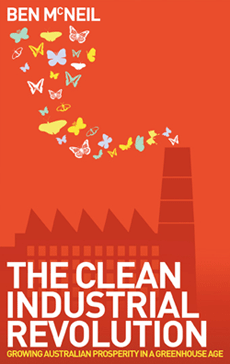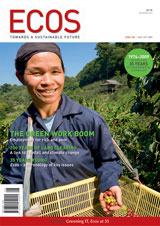
|
Published:
Our energy dilemma: biggest loser – or clean winner?
It’s a surprise to discover that in the public debate about climate change and clean energy, we can learn lessons from Google, Toyota and Saudi Arabia’s former King Faisal. But that’s what makes Ben McNeil’s first book, The Clean Industrial Revolution, such an absorbing and refreshing read.

|
|
The Clean Industrial Revolution Growing Australia’s Prosperity in a Greenhouse Age Ben McNeil Allen & Unwin 2009, Paperback ISBN: 9781741757224 – AU$26.99 |
McNeil is a qualified scientist, Masters of Economics graduate, executive of the Federation of Australian Scientific and Technological Societies, and expert reviewer for the UN Intergovernmental Panel on Climate Change.
With so much bad news emerging about our future in a warmer world, The Clean Industrial Revolution brings a lot of good news about Australia’s potential to develop a smarter, cleaner, low-carbon economy – if we act in time.
McNeil’s premise – not an entirely new one – is that we need to develop a new approach to reducing carbon emissions, based not just on moral or environmental considerations, but on economic advantage and low-carbon technologies that will not disadvantage developing economies.
‘Without the ability to quickly shift entrenched polluting capital, climate change cannot be combated in a capitalist, market-driven society,’ he writes.
Using well-annotated business case studies, examples from history and scientific evidence, he concludes that unless the government intervenes to decouple the economy from its high-carbon-fossil-fuel energy dependency, Australia will be left behind, as other countries such as Denmark, Germany, Spain and even China forge ahead with serious investments in clean energy.
The first section of the book – ‘The case for a pre-emptive strike’ – outlines the need for us to move quickly to a low-carbon economy.
McNeil invokes the analogy of Australia as ‘the most carbon obese nation in the developed world’, which means that ‘producing goods within Australia inherently produces high carbon emissions relative to other nations, irrespective of whether shoes or steel are produced’.
What’s the solution? Turn to page 85 and see how Australia could reinvent itself – with a little imagination and a lot of political will – by the year 2046. The final section of the book – ‘The new low-carbon economy’ – goes into more detail about the opportunities, green jobs and ‘accidental environmentalism’ of such a transition.
Politicians, business leaders and environmentalists will all learn something from this book – at the very least, that they have more in common than they think when it comes to clean energy futures.



